You are using an out of date browser. It may not display this or other websites correctly.
You should upgrade or use an alternative browser.
You should upgrade or use an alternative browser.
Kiss Me In The Dark Of Night - Ch. 2 - Invincible
- Thread starter MangaDex
- Start date
Dex-chan lover
- Joined
- May 4, 2024
- Messages
- 1,014
Thank you for the higher quality translations of this!
Group Leader
- Joined
- Jun 5, 2024
- Messages
- 404
Npnp its always nice to see people read higher quality stuff compared to mtl slopThank you for the higher quality translations of this!
Dex-chan lover
- Joined
- Jun 3, 2024
- Messages
- 154
What an absolute shit person you are lmaoNpnp its always nice to see people read higher quality stuff compared to mtl slop
No wonder everyone in the community is distancing themselves from you.
L1v doesn't MTL. And you dropping literally all the other series you're behind on just to try and keep up to prove some point nobody cares about really shows your true colors.
How many orbiters you gonna have left if you keep this one-sided fight with l1v up? I've watched you lose quality friends already due to it and you still don't learn.
Group Leader
- Joined
- Jun 5, 2024
- Messages
- 404
what are you on abt lmao. there're multiple scanlators in the community who are currently helping me catch mistakes (e.g. grammar, spelling, and etc.)No wonder everyone in the community is distancing themselves from you.
oh boy, i got a mountain of evidence just for youL1v doesn't MTL.



Canyue Sect of Maoshan would be the weirdest translation you could ever get out of 茅山蚕月派
茅山 = Mao Mountain ( an actual place in china, )
蚕 = Cicada
月 = Moon
if put together, it should be Mount. Mao Cicada Moon Sect
and all translations above are word-for-word google lens
Also, is - > was
its past tense and ofc you wouldn't know since google translate grammar is always on-point
oh theres more:



literally word-for-word copy of google translate. i can even get more if you want

don't even get me started on the "dollars" c'mon it's china. 500 dollars would be someone's monthly salary there.
although the raws do not specify which currency, the setting is in china thus the only possible answer would be "yuan"
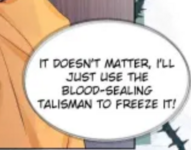
also using "immobilize" and then "freeze"?
inconsistencies like this only happen with google translate
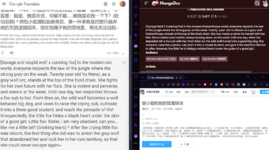
literally full on mtl'd the description of that other fox series
even the title of this series is extreamly incorrect
Kiss Me In The Dark Of Night would not be a possible translation of 黑夜轻吻我
why?
轻 = gentle / light
and that isn't expressed in the title
unfortunately, i'm a group and not a solo worker. if a certain series was translated and redrawn by me, it wouldn't be receiving monthly updates. you have to remember that not everyone's like you and can spend 7 hours a day on md forums arguing with little kids.And you dropping literally all the other series you're behind on just to try and keep up
currently, i only have 13 series under my group.
there are actually people out there who care about high-quality scalation, but that isn't you so you can't speak about the majority.to prove some point nobody cares about really shows your true colors.
How many orbiters you gonna have left if you keep this one-sided fight with l1v up? I've watched you lose quality friends already due to it and you still don't learn.
if i did have those, then they wouldn't leavequality friends
i actually don't even have friends in scalation. it's just co-workers or staffs.
Last edited:
Group Leader
- Joined
- Jun 5, 2024
- Messages
- 404
L1v doesn't MTL.





theres no chance you can even get "I respect you" without the use of MTL
no, im not saying i dont mistranslate things at all. i have loads of missed references and im sure if i have a few mistranslations here and there and i would prob fix them if someone brought it to my attention as long as it's not one of the chapters id did before october
also you keep saying that l1vs has a chinese degree. not everyone who has a degree can translate btw. translating comics is all about how fluent you are in both languages. ive encountered several chinese translators who i deem "doesn't meet standards for translating" because they can't get the tone right from chinese to english or from the panel
Last edited:
Supporter
- Joined
- Mar 30, 2023
- Messages
- 198
You say that, but this one is just bad... Not only is the font incredibly hard to read for the onomatopoeias, but there is times you directly change what is said in english in the raws such asNpnp its always nice to see people read higher quality stuff compared to mtl slop




which if we compare to L1v's are




which are weirdly written verbatim how it was written in english in the original raws




It's a little unusal the person accusing someone of MTLing is also the person incapable copying down verbatim english especially when the english is grammatically correct in the first place. And this is not even talking about the mountain of issues your translation has where it is just miss-translates things more times than I wish to count purely because you wanted to make it sound more poetic in english, and this is all ignoring how line for line all your translations are just reworded versions of what L1v has in theirs. So either MTL is insanely good for mandarin now-a-days... or maybe quit accusing people when you can't bring a single point against them Edit: this part was written before you replied but took so long to post I did not see your pictures. It still stands though.
(I speak cantonese btw so while my mandarin is not the best it is at least good enough to notice the obvious rewording you do constantly to the point it no longer ressembles the original and feels like a SevenSeas creative liberties translation...),
Group Leader
- Joined
- Jun 5, 2024
- Messages
- 404
actually, the english used in the raws were mtl'd into english thus making it incorrect for actual scalation usage.You say that, but this one is just bad... Not only is the font incredibly hard to read for the onomatopoeias, but there is times you directly change what is said in english in the raws such as



which if we compare to L1v's are




which are weirdly written verbatim how it was written in english in the original raws




It's a little unusal the person accusing someone of MTLing is also the person incapable copying down verbatim english especially when the english is grammatically correct in the first place. And this is not even talking about the mountain of issues your translation has where it is just miss-translates things more times than I wish to count purely because you wanted to make it sound more poetic in english, and this is all ignoring how line for line all your translations are just reworded versions of what L1v has in theirs. So either MTL is insanely good for mandarin now-a-days... or maybe quit accusing people when you can't bring a single point against them Edit: this part was written before you replied but took so long to post I did not see your pictures. It still stands though.
(I speak cantonese btw so while my mandarin is not the best it is at least good enough to notice the obvious rewording you do constantly to the point it no longer ressembles the original and feels like a SevenSeas creative liberties translation...),
also it's changed to match the flow of the convo


have you ever heard someone irl say "what's this? what is it used for?" ofc not the more natural way would be "what's this? and what's it used for?" or "what's this? and what is this used for?"
also, the english everyone's forced to learn in school back in china is super different from what's learned here in uk/us. i can confirm since ive been living in china for more than half my life
Last edited:
Group Leader
- Joined
- Jun 5, 2024
- Messages
- 404
that's pretty raw-accurate then.Not only is the font incredibly hard to read for the onomatopoeias,
some sfx in the raws took me an hour to figure out + i even asked several other chinese translators to help out
e.g.

with evidence of me and others trying to figure this mess out:
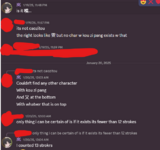
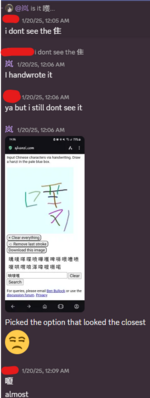
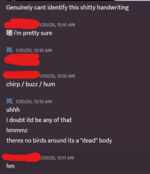
all that thinking just to endup with 嗖 as the correct and final answer
Supporter
- Joined
- Mar 30, 2023
- Messages
- 198
oh boy here we go.... alright lets go point by point shall we....what are you on abt lmao. there're multiple scanlators in the community who are currently helping me catch mistakes (e.g. grammar, spelling, and etc.)
oh boy, i got a mountain of evidence just for you



Canyue Sect of Maoshan would be the weirdest translation you could ever get out of 茅山蚕月派
茅山 = Mao Mountain ( an actual place in china, )
蚕 = Cicada
月 = Moon
if put together, it should be Mount. Mao Cicada Moon Sect
and all translations above are word-for-word google lens
Also, is - > was
its past tense and ofc you wouldn't know since google translate grammar is always on-point
This is not mao mountain. This is a proper name of a mountain in china called 茅山, but that is also ignoring just how this has a second meaning which is that of a type of taoist priest specifically specialising in exocisms (sound familiar to what the MC is doing?). Either way in no way would it ever be called mao mountain or mt. mao since if you are going to split the proper name to use 山 to mean mountain then you might as well just go and translate 茅 as well into tao since it literally means "tao mountain" since its a holy lpace for taoism. If you do not even know the basics of what you are translating how come you are preaching like you are a dunning-kruger subject?
is not cicada it is silkworm... Cicada is 蝉.
no it would not... if you wanted to be the most literal possible it would be "Taoist mountain's slkworm moon sect" or in your more poetic rewording something more similar to "The mount of the great Tao's silkworm moon school/sect"if put together, it should be Mount. Mao Cicada Moon Sect
Have you ever looked up what word-for-word or it's more proper term verbatim mean? It means quite literally word for word copied not:literally word-for-word copy of google translate
vsI'm so lucky that I encountered a legendary monster?
Am I really so lucky that I met a legendary monster?
vsOr is it that Eastern magic cannot defeat western monsters?
or we can just use yours tooOr is it that eastern spells can't defeat western monsters?


Which is suspiciously exactly the same thing just slightly rewritten?
especially when the original is
in the first one it technically says我运气这么好, 遇上传说级的 大妖了? (Am I really that unlucky to have met a legendary demon?
还是说东方的法术 对付不了西方的妖 怪? (Or can eastern sorcery not deal with western monsters?)
but this is said sarcastically which does not nessairly translate into english well so I used unlucky to more clearly express it is negative, but if you just retain the original it would more accurate translate to "Do I really have the great forturne of meeting a legendary demon [sarcastic]?"我运气这么好 (I have so much good fortune)
The second on the other hand does say what it says in google lens and not what you said. It actually says
which means supernatural abilities (i.e. magic, sorcery, budda's powers, taoist & shinto abilities, etc) and is typically translated as either magic or sorcery. A taoist talisman (sometimes called seals like you used) is 符箓. After that you say
when it sayswestern-type demons?
which is a bit complicated so will just explain it instead. It says [西方]+[的]+[妖] [怪]?which is broken down [the west]+[mandarin's genetive case marker]+[adjective meaning bizzare or evil (sometimes can mean demon or goblin, but the next word here is that so it just means evil like "evil demon")] and then 怪 which is actually short for 怪物 which is a slang word meaning monster in a story or video game (though sometimes you can see it used to describe a human in which case it is similar to how in english you describe someone as a "monster" even though they're clearly a human. Now with that context done I do not think using demon here is accurate (I never find translating 怪 into demon but leaving 妖怪 alone and just transcribing it as youkai\yōkai as accurate for this reason) since a demon inherently is evil. Period. There is no negotating; they just are. But 怪 (and by extention 妖怪) are never inherently evil. They are almost always either amoral or neutral as a basis hence why in this very line they describe the 怪 as 妖 specifically since even 怪物 is not inherently evil. So instead it should be more accurately described as西方的妖 怪?
or evenwestern guai?\western monsters?
Which is weirdly enough what the MTL and L1v said instead. Neither of you said any of this. and by the fact you did not just easily dispute it by explaining what the mandarin says instead of using google lens as your proof, I question whether you actually knew this yourself...western evil guai?\western evil monsters?
It is not. The sentence is present continous as she is not questioning whether eastern magic being ineffective was taught in school. She just tried to use it, failed, and is now questioning why it failed.Also, is - > was
Firstly I agree about the dollars. That makes no sense besides maybe some attempting to localise it for dumb americans who do not understand foreign currencies exist (or heavens forbid other countries with their own dollars as a notation). That being said however they never did specify which dollars are being used. Even if we assume it is only USD as a basis, 500 is still really low. That is like I just graduated university and am working a cashier postion part time levels of broke. A normal person would work two of those if they had to. Most people usually makee ¥5-8k (700-1100 USD) a month in rural areas or sub-urbs. If you go to actual cities (hell even go to shanghai which has the highest minimum wage in all of mainland china with ¥2690 (about 380 USD) minimum) and you will see no one can possibly survive on even remotely close to that and normally are making ¥11-15 (especially in shanghai where people regularly make upwards of ¥20k) (1500-2000 and 2800 USD/month respectively) which is fairly comparable to most cities in the US outside megacities like NYC, Chicago, LA, etc (which if we are going to use those why not just use shanghai and beijing condos and multi floor appartments in the skyscrappers for the super rich elite like how Manhattan does and we see them make >100k to millions a month (5-6 figures in USD) which is the same as the US is. If you can find me a single person in all of Guangdong who survives exclusively on ≤¥3600/month to pay for everything (food, rent/mortgage, gas for their car, transportation pass, electricity, water, etc etc) I will gladly give you 500 USD since that is not happening. where I live right now rent alone is close to 500 USD and that is considered standard rent avg for all of EA and SEA.don't even get me started on the "dollars" c'mon it's china. 500 dollars would be someone's monthly salary there.
although the raws do not specify which currency, the setting is in china thus the only possible answer would be "yuan"
Again I agree here. I have no idea where the title in english came from, but personally if I was to translate it it would beeven the title of this series is extreamly incorrect
Kiss Me In The Dark Of Night would not be a possible translation of 黑夜轻吻我
why?
轻 = gentle / light
and that isn't expressed in the title
orThe Night softly kissed me (轻 also means soft in this context like "I gently carassesed her cheek" vs "I softly carassesed her cheek")
I was gently kissed by the night
okay so here I have an issue. And the issue is not what you think. So the issue is what is said in the panel you aer calling out is{Live does not do MTL pics}
The issue there is.... it does actually mean what the MTL says though? So the second part there 『我敬你』 is a bit idiomatic but does actually mean "I respect you". Literally +[respect]+[you]. You can translate it a number of ways depending on context from "I salute you, captain", to "I can toast to that", to even just "hear hear!". So by saying that you can only get this from MTL is a little unfair since if you did not know the idiomatic expressions of 敬 you can easily miss the second meaning of "to offer something" (here being alcohol) aka +[verb to offer]+[you] which you point out yourself came from a context of respecting the other by drinking first. I do think it would be easy to realise even if you MTL'd since it makes no sense with the follow up response, but that does not mean someone who is bad at english and mandarin might not make that mistake or know it but just badly worded it.苏老师, 我敬你。
That being said you also used google lens (MTL) and it also correctly said what it meant even in the search so apparently MTL does know the verb usage?
Supporter
- Joined
- Mar 30, 2023
- Messages
- 198
I agree it is a mess, but that does not mean as the translator you have to make it just as much a chore to read for the reader. As someone who has translated EN -> Yue and KR -> EN as my paid job for publication companies for years the readers experience makes or breaks your job immediately. If 50 people out of 150 decide not to read since they saw the first three pages and that it was in comic sans and left, you failed. Simple. There is a reason translator notes even exist to explain to people things such as cultural context of words so they do not have to research it themselves.that's pretty raw-accurate then.
some sfx in the raws took me an hour to figure out + i even asked several other chinese translators to help out
e.g.

with evidence of me and others trying to figure this mess out:
View attachment 15174
View attachment 15177
View attachment 15180
all that thinking just to endup with 嗖 as the correct and final answer
Supporter
- Joined
- Mar 30, 2023
- Messages
- 198
Why do you always use MTL to show your evidence instead of just explaining what the characters or words mean like a normal translator... Even if you speak 普通话 normally it still just a weird way to try and prove you are better than MTL by showing yourself MTLing...actually, the english used in the raws were mtl'd into english thus making it incorrect for actual scalation usage.
also it's changed to match the flow of the convo


have you ever heard someone irl say "what's this? what is it used for?" ofc not the more natural way would be "what's this? and what's it used for?" or "what's this? and what is this used for?"
also, the english everyone's forced to learn in school back in china is super different from what's learned here in uk/us. i can confirm since ive been living in china for more than half my life
Group Leader
- Joined
- Jun 5, 2024
- Messages
- 404
Because this is about l1vs using google translate ? And im just showing the similarities between google translate's output & what l1vs originally hadWhy do you always use MTL to show your evidence
no im showing you that the author mtl'd the chinese to english you knuckleheadinstead of just explaining what the characters or words mean like a normal translator... Even if you speak 普通话 normally it still just a weird way to try and prove you are better than MTL by showing yourself MTLing...
Group Leader
- Joined
- Jun 5, 2024
- Messages
- 404
im aware the actual english name of the mountain is Maoshan Mountain, but i'd feel really weird to readers who know some chinese, it'd read like Mao mountain mountain to them.This is not mao mountain. This is a proper name of a mountain in china called 茅山
thats just one more into my bucket of missed references ig. i'll fix it later, thanks for pointing it out.but that is also ignoring just how this has a second meaning which is that of a type of taoist priest specifically specialising in exocisms (sound familiar to what the MC is doing?). Either way in no way would it ever be called mao mountain or mt. mao since if you are going to split the proper name to use 山 to mean mountain then you might as well just go and translate 茅 as well into tao since it literally means "tao mountain" since its a holy place for taoism. If you do not even know the basics of what you are translating how come you are preaching like you are a dunning-kruger subject?
im only a bit familiar with daoism since ive worked with one whole chapter about it in the past. ill do more research about this topic later. but this is also one of the things normal people wouldn't typically know of.
ah, my mistake then. may be a regional thing. i learned 蚕 to be cicadais not cicada it is silkworm... Cicada is 蝉.
thanks for pointing it out, i'll be fixing that in a bit.
it's pretty much word-for-word in a lot of casesHave you ever looked up what word-for-word or it's more proper term verbatim mean? It means quite literally word for word copied not:
L1v's translation and your "more accurate" translation doesn't really carry the negative connotation the raws carried. (also your line sounds pretty unnatural imo)in the first one it technically says
but this is said sarcastically which does not necessarily translate into english well so I used unlucky to more clearly express it is negative, but if you just retain the original it would more accurate translate to "Do I really have the great forturne of meeting a legendary demon [sarcastic]?"
i'm generally pretty disconnected with slang terms. but thanks ill fix that part about the chapterwhich means supernatural abilities (i.e. magic, sorcery, budda's powers, taoist & shinto abilities, etc) and is typically translated as either magic or sorcery. A taoist talisman (sometimes called seals like you used) is 符箓. After that you say
when it says
which is a bit complicated so will just explain it instead. It says [西方]+[的]+[妖] [怪]?which is broken down [the west]+[mandarin's genetive case marker]+[adjective meaning bizzare or evil (sometimes can mean demon or goblin, but the next word here is that so it just means evil like "evil demon")] and then 怪 which is actually short for 怪物 which is a slang word meaning monster in a story or video game (though sometimes you can see it used to describe a human in which case it is similar to how in english you describe someone as a "monster" even though they're clearly a human. Now with that context done
i didn't think it was either, but that's how my pr wanted me to render it,I do not think using demon here is accurate
but youkai/yokai is more of a japanese term iirc and i'd like to not use japanese terms as much as possible(I never find translating 怪 into demon but leaving 妖怪 alone and just transcribing it as youkai\yōkai as accurate for this reason)
as i said before, im showing google lens tls because i mentioned it many times earlier that l1vs copies whatever google lens spits out, so the only way to prove that they're mtl is by bringing out the mtl and comparing.since a demon inherently is evil. Period. There is no negotating; they just are. But 怪 (and by extention 妖怪) are never inherently evil. They are almost always either amoral or neutral as a basis hence why in this very line they describe the 怪 as 妖 specifically since even 怪物 is not inherently evil. So instead it should be more accurately described as
or even
Which is weirdly enough what the MTL and L1v said instead. Neither of you said any of this. and by the fact you did not just easily dispute it by explaining what the mandarin says instead of using google lens as your proof, I question whether you actually knew this yourself...
no, the sentence came before her questioning whether eastern magic was ineffectiveIt is not. The sentence is present continous as she is not questioning whether eastern magic being ineffective was taught in school. She just tried to use it, failed, and is now questioning why it failed.
would you say "the blood sealing talisman is the first tailsman i learned" or "the blood sealing tailsman was the first tailsman i learned"?
from context, the characters are literally drinking alcohol so theres no way you can mistakenly translate 我敬你 into anything other than "I'll toast you." if you know chinese then theres absolutely no way you've never heard of 我敬你. im not even of age to drink and ive heard of it from movies and whatnot. You can pretty much only get "I respect you" from mtl. like if you mtl'd with a brain youd know the follow-up made 0 sense with "i respect you" and a simple google search would get you "i'll toast you" which fits perfectly into context with the scene.okay so here I have an issue. And the issue is not what you think. So the issue is what is said in the panel you aer calling out is
The issue there is.... it does actually mean what the MTL says though? So the second part there 『我敬你』 is a bit idiomatic but does actually mean "I respect you". Literally +[respect]+[you]. You can translate it a number of ways depending on context from "I salute you, captain", to "I can toast to that", to even just "hear hear!". So by saying that you can only get this from MTL is a little unfair since if you did not know the idiomatic expressions of 敬 you can easily miss the second meaning of "to offer something" (here being alcohol) aka +[verb to offer]+[you] which you point out yourself came from a context of respecting the other by drinking first. I do think it would be easy to realise even if you MTL'd since it makes no sense with the follow up response, but that does not mean someone who is bad at english and mandarin might not make that mistake or know it but just badly worded it.
no clue how google tl works man, you gotta ask l1vs for that one, but im sure it can pickup on context and semi-accurately translate stuffThat being said you also used google lens (MTL) and it also correctly said what it meant even in the search so apparently MTL does know the verb usage?
on the topic of mistranslations and whatnot, just found this really odd.
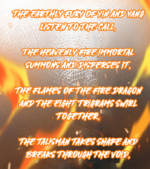

also you read this in the incorrect order, l1v.
天火真人急召降 should come before the 地煞阴阳听号令 line but you had it the other way around.
fury wouldnt be the right word to describe 煞
煞 - demons / chaotic and destructive beings

Dex-chan lover
- Joined
- Jun 3, 2024
- Messages
- 154
Aaaahahahhahahahaahhaahha
My favorite part about all this is kora uses a little mtl to prove a point she entirely made up when I have read all of these series raws using mtl and I know for a fact that they're wildly different.
So lemme ask this:
If I said Kora eats toe fungus for breakfast and Kora disagreed, would it be proof of Kora eating toe fungus for breakfast if I found a picture of Kora chewing on her toes once?
Would that be enough proof? What if there are a multitude of pictures showing Kora eating her piss-filled Wheaties or whatever she actually really eats instead of toe fungus to go with those? Would that one picture of Kora still chewing on her own toes be a valid mountain of evidence?
Either way my overall point is Kora is gross and does this whole thing for an ego trip and is threatened by l1v for literally no reason.
My favorite part about all this is kora uses a little mtl to prove a point she entirely made up when I have read all of these series raws using mtl and I know for a fact that they're wildly different.
So lemme ask this:
If I said Kora eats toe fungus for breakfast and Kora disagreed, would it be proof of Kora eating toe fungus for breakfast if I found a picture of Kora chewing on her toes once?
Would that be enough proof? What if there are a multitude of pictures showing Kora eating her piss-filled Wheaties or whatever she actually really eats instead of toe fungus to go with those? Would that one picture of Kora still chewing on her own toes be a valid mountain of evidence?
Either way my overall point is Kora is gross and does this whole thing for an ego trip and is threatened by l1v for literally no reason.
Similar threads
- 12
- Replies
- 13
- Views
- 10
- Replies
- 11
- Views
- 15
- Replies
- 16
- Views
- 10
- Replies
- 11
- Views
- 9
- Replies
- 257
- Views
Users who are viewing this thread
Total: 2 (members: 0, guests: 2)